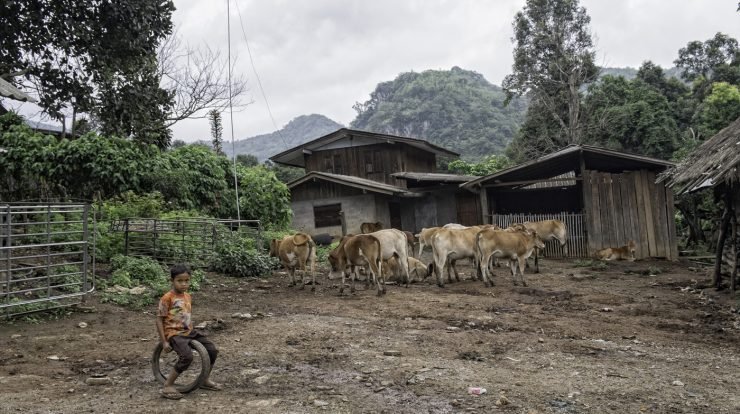Asia Thinkers speaks to Operations Manager, Billy Curryer for an insight into how Karen Hilltribes Trust came to be, the unique work that they do and how readers can get involved…
Tell us about the origins of Karen Hilltribes Trust, how it commenced and the reasons behind supporting the foundation?
The roots of the Karen Hilltribes Trust can be traced all the way back to 1986, when the current KHT Programme Director, Salahae, met a British Expat teaching at a school in Mae Phon. To address the lack of clean water in Mae Phon, they combined their knowledge to design the very first clean water system. The life changing benefits quickly became clear, and with so much more need in the region, the idea was born to form an organisation which would work with Karen communities to help build a better future for themselves. In 1989, this was made a reality, with the registering of the Mae Phon Karen Hilltribes Trust.
From the early days, the organisation welcomed groups of British volunteers to be involved in an array of projects, travelling to Thailand from schools and universities in the UK and other countries. One of these young volunteers was Richard Worsley who in 1990 spent six months with the Karen, while helping to build clean water systems and teaching English to Karen children.
Life was sadly short for Richard. In 1996, at the age of just 24, he was killed in a car accident. In memory of Richard, the Karen people dedicated a water system in the village of Huay Kong Po but his death was to leave a far greater legacy. Richard’s mother, Penelope Worsley, touched by the stories Richard shared, visited Huay Kong Po in 1999 and discovered the warmth and gratitude of the Karen people. It was from here that a link with the UK was made. In 1999 Penelope established the Karen Hilltribes Trust as an international organisation by opening a fundraising office in York, UK, and officially reregistered the Karen Hilltribes Trust (KHT) as a charity in 2002, in memory of Richard.
Since its humble beginnings KHT has seen over 500 volunteers follow in the footsteps of Richard, and volunteering is now central to the organisation’s ethos. After over 30 years, Salahae continues to lead the work in Thailand and KHT now has seven other Karen staff helping deliver projects across the region. In the UK, after over 17 years dedicated to the charity raising life-changing funds, Penelope has retired and KHT is now headed up by former volunteer, William Harnden for whom the memory of volunteering in the village of Mae Tho Tai stays vivid.
Clean water has now been delivered to more than 55,000 people, and further projects have been developed by the Karen staff and community in the areas of agriculture and education.

Salahae with KHT Irrigation Project
The trust focuses on being a community led organisation. What was the motivation behind this initiative?
The approach at KHT is one in which the Karen community lead the installation of the projects which are designed to improve their livelihoods. All of our work is governed by this principal, as we believe it is essential if the results of development are to become sustainable. Our staff in Thailand are all Karen. They have the skills and experience to manage our projects, but we also require the full support of the local people in each village in order to finish any major construction on time and within budget.
Right from the start, KHT has always focused on taking a community-led approach. This began with the first project in Mae Phon in 1986, where Salahae, who is from a remote Karen village called Ban Rom Yen, helped design and install the very first clean water system. Since then, all of KHT’s projects have been designed, built and maintained by the communities who have received support, using their local knowledge. The reason KHT adopts this approach, is that it helps to empower Karen communities to create a self-sufficient future for themselves. This results in projects that are high in impact, low in cost and most importantly sustainable.
Tell us a little about the team behind the trust, and your role within the group?
The Karen Hilltribes Trust team is made up of 10 staff members, seven Thai-Karen and three British. Nine of the team are based in Thailand, including the Director.
In April 2013, William took over as Director of the Trust from Penelope. William is a former volunteer, having been part of one of our clean water projects in 2006. He is responsible for the organisation achieving its mission, oversees the projects taking place in Thailand, engages with donors based in Asia, UK and the United States, and works closely with the board of Trustees on KHT’s development strategy.
The majority of the Thai-Karen team have been working with KHT for over 15 years, and hence have ample experience conducting projects in the Mae Hong Son Province. My role is, Operations Manager. As part of my role, I support the Thai Karen team with all operations taking place in the Mae Hong Son Province and report on all the projects that the organisation conducts.

School meals
The trust’s key aims are to work with the Karen community improving health, increasing access to education and securing better livelihoods for the Karen Hilltribes. Can you give us some details on the types of programmes the trust is managing and the impact this has had so far on the livelihood of the Karen?
In total, the organisation currently operates six different projects – Water and Sanitation; Irrigation; School Buses; School Meals; School Dormitories; Higher Education Scholarships – that focus on improving community health, securing better livelihoods and increasing access to education.
Since the beginning of the projects, KHT has provided over 55,000 people with clean drinking water and improved sanitation facilities, brought 2,500 acres of farmland back into production through providing a reliable source of irrigation all year round, and helped over 12,000 children and young people to access an education through the provision of school buses, school meals, higher education scholarships and the construction of school dormitories.
KHT also constantly works hard to identify new projects that would benefit Karen communities in the Mae Hong Son Province. We do this through regular communication with the communities that our projects support.
What are some of the challenges the trust faces while working to support these programmes? What would you say are the key achievements?
As we work with some of the poorest communities in the province, which can be up to six hours drive away, and conduct up to 16 different projects a year, logistics is one of the major challenges faced. On a daily basis, this involves making sure that all materials can be delivered, staff are available to conduct the project, and the projects can go ahead.
Some of the greatest achievements the organisation has experienced is the amazing impact and amount of Karen people that the organisation has reached. Over 70,000 people have been supported by the organisation, empowering them to create a more self-sufficient future for themselves. The long-term aim is to enable all Karen communities in the Mae Hong Son Province to live in a sustainable way in Thailand, in harmony with the environment.
How do you fund your activities? Do your receive support from the local government, or community organisations? What has been the reaction to your work by the authorities?
All of our activities are funded through donations and grants made by trusts and foundations, companies or individuals. Although we do not receive financial support from the local government or community organisations, we always work in close partnership with them.
The reaction of the authorities to our work is always positive. KHT recently conducted a large project in a rural area of the Mae Hong Son Province, called Sao Hin. This area previously had no infrastructure and the communities were very poor. Over a number of years, KHT installed numerous clean water systems, irrigation systems and has built a school dormitory. Since the work of KHT, the authorities have improved the road conditions and other infrastructure in the area, helping to improve access to the region and overall development. We think that this is a really great example of the reaction of the authorities and how we work in partnership.
It is reported that the trust recruits a large number of volunteers to support Karen community programmes. What kind of programmes do volunteers get involved with, and what benefit do they bring to these projects?
Volunteers are integral to the ethos of KHT and benefit the organisation and Karen communities in a number of different ways. The majority of our volunteers provide support through one of our volunteer projects – Clean Water or Teach English.
As part of the Clean Water Project, volunteers live in a rural Karen community for one month and support the construction of a gravity-fed water system in the village. As our projects are reliant on community support, volunteers provide extra hands for the project and help to reduce the amount of community support required. In addition, living in the village for one month gives the community the chance to meet, socialise with and get to know people from a different area of the world, which often increases engagement in the community. However, one of the greatest things is that having volunteers on a project makes it a little bit more special for everyone involved.
As part of our Teach English Project, volunteers teach English at a local school, using their native English to help improve speaking ability in their classes. In addition to improving student English ability, our volunteers often become friends with the local teachers and will help improve their English and teaching ability as well. We see this as one of the key benefits of the English project, as improving teaching standards creates long-term education benefits.
After volunteering, many of our volunteers support the organisation long into the future, with our current Director, William, and the majority of our trustees being former volunteers. Over the years, we have also had a number of UK volunteers who support the operational side of the organisation in our UK office, including fundraising, marketing, and communications.

KHT Volunteer Project
Is there anything else that you would you like to tell our readers who may be interested in volunteering with the trust?
The volunteer opportunities that KHT provides gives volunteers the opportunity to work on real charity projects that take place every month of the year. This makes our projects a truly unique experience where you get the chance to immerse yourself in rural Karen community whilst helping improve the lives of hundreds of people at a time. Found out why you should volunteer with us on our website – https://www.karenhilltribes.org.uk/why-volunteer-us
“KHT really do make a difference, as we saw on the faces of the 800 strong Karen people in Ban Pang Tong who now have enough clean, safe water to live on. Incredible.” -Louise, Water Project – 2016

